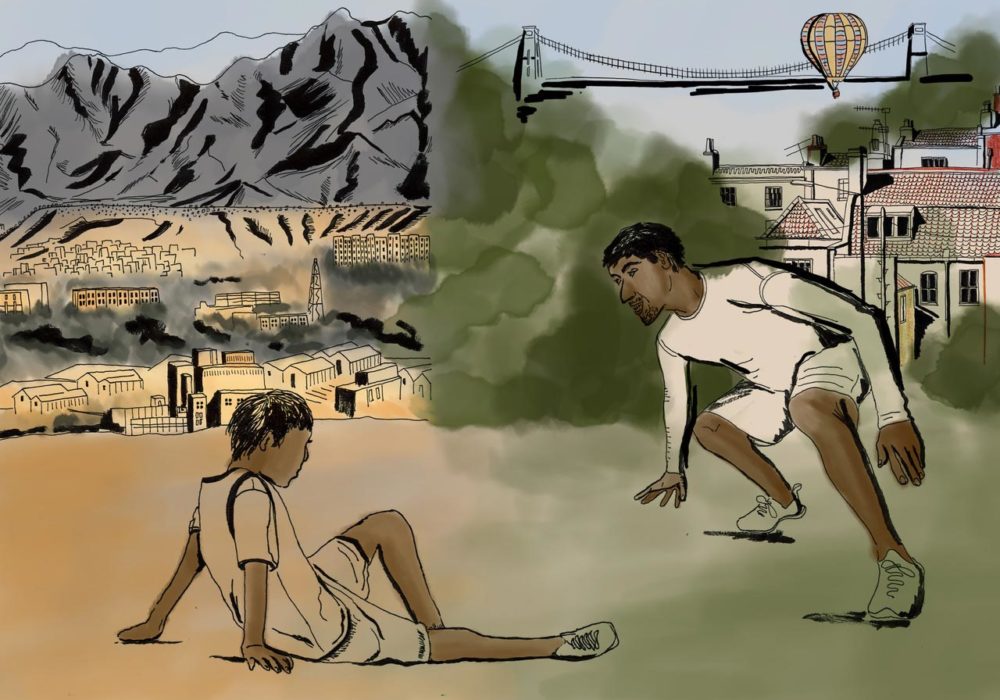
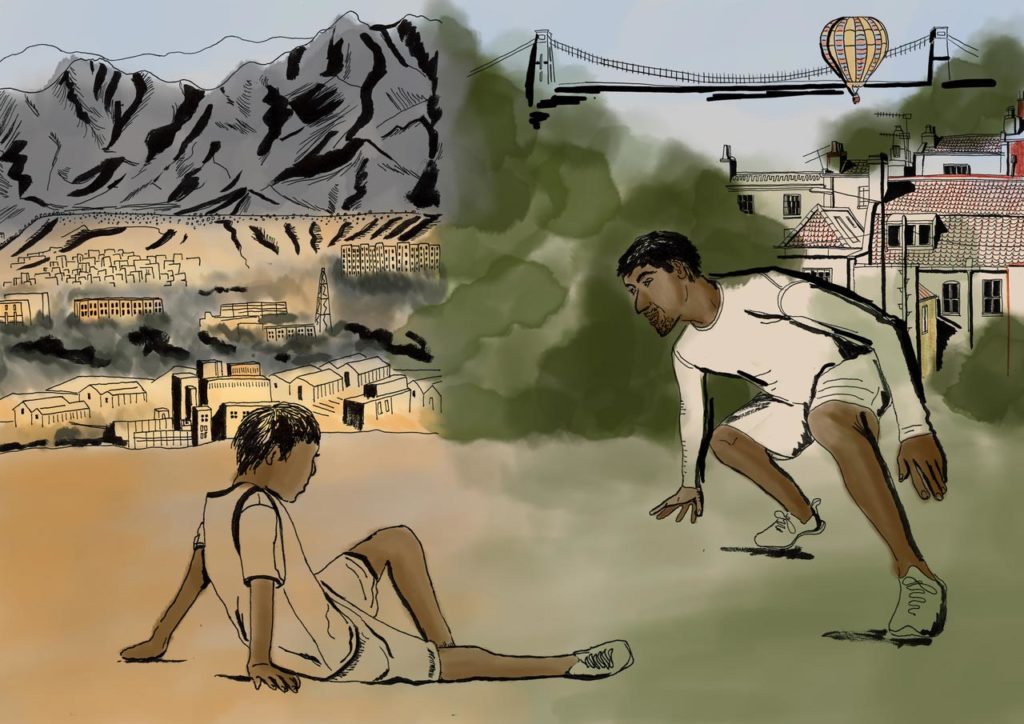
The illustration by Laurel Molly. Find her on Instagram @laurel_molly.
For young people caught up in the UK’s asylum system, the good intentions of everyone concerned by no means guarantee a fair outcome.
Ali, a polite, dark-eyed boy who loves cricket and boxing, arrived in the UK on his own when he was thirteen and was placed in care. Seven years later his legal status was still unresolved, he’d lost housing and income support and was effectively homeless, couch-surfing when he could with friends. He had trouble sleeping, was always exhausted and his resulting poor memory made it difficult to remember appointments and information from his solicitor. As the people he went to school with headed off for jobs and university, he was stuck in legal limbo, depressed and anxious, unable to move forward with his life. His story is by no means uncommon.
Separated children and young people seeking sanctuary in the UK are put into the same social care system as British children. Although there are many overlapping needs, there are also critical differences. Beyond the significant cultural and language differences, young people seeking asylum must engage in the legal system in order to receive the legal right to remain in the country—a right upon which every other kind of security, wellbeing and opportunity is ultimately dependent. In many places, social workers and other local authority workers are overworked, underfunded and do not have the expertise necessary to navigate the complex asylum system. Because of this reality, children and young people sometimes do not receive appropriate legal advice or representation and therefore their cases are inappropriately refused.
Thankfully, Ali was eventually referred to Bristol Refugee Rights (BRR) and this was when things started to turn around for him.
For the past two years a Bristol Refugee Rights project called The Young People’s Immigration Project has worked one on one with more than sixty-nine unaccompanied young people seeking asylum. Many of them have fled the conflict in Afghanistan, have lost family members who were killed and have undergone a long and often violent and chaotic journey overland from Afghanistan to the UK. Some were forced into modern day slavery at the hands of smugglers and managed to escape harrowing situations. All of them arrived in the UK alone as children.
Our staff at BRR meet each young person, get to know them, hear their story, piece together what went wrong for them, and organise mental health support for them. Often this is the first time they have been given any tools to understand the trauma symptoms they are experiencing. We help them find a solicitor or to understand the work their current solicitor is doing. Our experienced staff often discover new evidence that nobody else has thought of and we do the leg work to chase down this evidence. We write letters to submit to the Home Office about what we come to know about the young person, their past, their present, their needs and vulnerabilities. Sometimes our staff go to asylum court as witnesses. In some cases, our testimony has played a key role in the judge’s positive decision.
Our staff did all this work with Ali, collecting evidence, writing letters and perhaps most importantly, convincing the local authority who had been supporting him since he arrived in the UK to provide evidence. They were hesitant at first to be involved in the legal side of things, but BRR worked with them to see how relevant their assessment of Ali’s needs and vulnerability was to his case. In the end, Ali’s Personal Advisor not only wrote a letter, but also attended his hearing as a witness. Ali’s appeal was eventually successful— he received refugee status. At first he struggled to believe he’d won. But once it had sunk in, he was so relieved. His goal of working towards becoming a professional sports coach was now possible. But to achieve that goal Ali, who is still homeless, will have to start from the beginning without any job experience and try to find a job. All without the safety net of family or dedicated social services staff. His story, while a success, highlights how many obstacles separated young people face in building a secure life here in the UK.
The Young People’s Immigration Project is moving onto a second phase. Bristol Refugee Rights is taking all this experience of working with underage people seeking asylum and we are focusing our efforts on improving the system. We are working with Bristol social services to address the systemic issues that cause separated children and young people to fall through the cracks in the first place. The goal is that no young person has to go through what Ali and so many others had to go through. The goal is that good intentions are reliably turned into safety and justice for vulnerable young people.
Tannith Perry
Donate to our important work.
Read more about Young People’s Immigration Project.
Read our member Mosi’s experience in the Penally Camp Army Barracks.
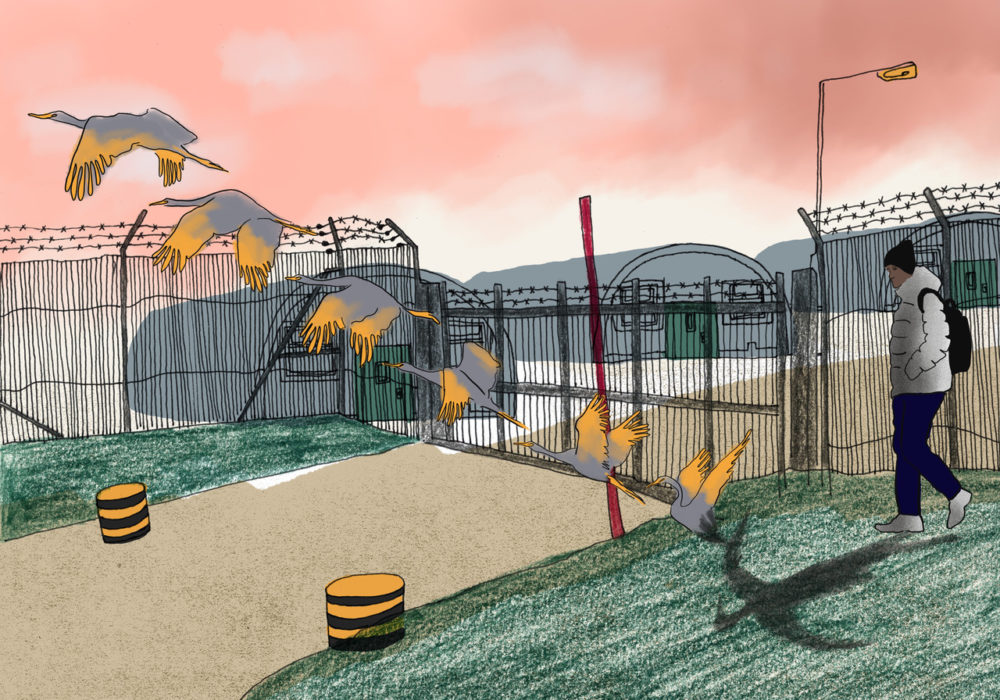
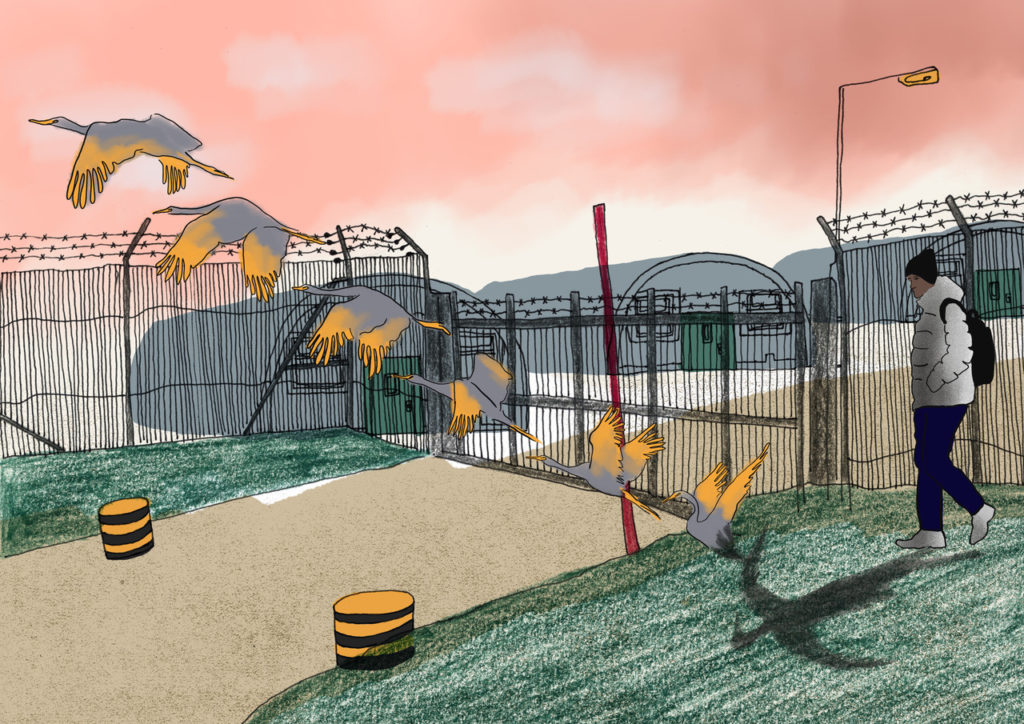
The illustration by Laurel Molly. Find her on Instagram @laurel_molly.
There are six strange men asleep in the small, cold room with him. Each on blue plastic mats on the floor. One mutters to himself. Another snores like an irregular chainsaw. A third has night terrors that wake everyone up. Even without the sounds, Mosi cannot sleep. Sometimes there’s so little fresh air in the cramped space that he feels like he can’t breathe. And if he does breathe, will it bring Covid into his lungs? Then there’s the fact that he can’t be sure that the men who work there won’t pull him out at any moment and torture him. It’s happened to him before. Although that was in his own country. And this is the UK.
After he escaped from the military camp where he was held and tortured, he thought life in the UK would be different. He’d heard that there, it was safe to be gay. That men like him didn’t have to be scared to live openly. He thought maybe the depression and fear that have stalked him ever since he was imprisoned would go away. But here he is. Back in another kind of prison. Terrified. Alone. With no idea how long he will have to stay.
To Mosi, cleanliness is very important. In the government-provided housing back in Bristol, he often cleaned up after his housemates because he couldn’t stand any mess. Here, there are too many people to clean up after and the mess is worse. Cigarette butts and hair balls in the shower drains, filthy toilets, puddles of water on the cement floors, mould in the bathroom. The other asylum seekers wash their clothes in the sinks or in rubbish bins because that’s the only way. The rest of the time there’s nothing to do; no games, no TV, no Wifi, no classes. So most people sit and stare out the windows at the depressingly run-down barracks or sometimes at a wall. At least a wall is blank and doesn’t remind Mosi that he’s back on a military base.
While Mosi stares at a wall, staff at Bristol Refugee Rights are working to get him released. They contact the Home Office and remind them about Mosi’s vulnerabilities, the fact that he had been receiving weekly mental health treatment and was waiting for appointments to diagnose a potentially life-threatening health condition. All information that the Home Office already had, but disregarded when they decided to move Mosi from the asylum seeker shared housing in Bristol and put him in Penally Camp. Still, the charity staff make phone calls and write letters. Gather evidence.
Penally Camp is renowned among human rights activists and refugee charities for its terrible living conditions. Helen Bamber Foundation and Doctors of the World have publicly called for improved conditions or closure, citing issues around access to clean and sufficient food and water as well as generally degrading conditions. And residents have themselves staged protests, asking for the camp to be closed. Part of these problems stem from the lack of planning on the part of the Home Office to make sure that the site was safe, that there were adequate services nearby and that locals were consulted.
Although many locals do support the people in the camp, there are others who, for a variety of reasons, do not think the camp should be there. Sometimes far-right groups gather at the gate, chanting and holding signs. They believe that Britain is being “invaded” by refugees and resent the fact that any assistance is being given to them. This can make going out the camp gates for a walk dangerous and terrifying.
There are no medical, educational or legal services on site. In such circumstances, especially without WIFI, it is difficult for the asylum seekers to interact with their solicitors, get to know them enough to share the traumatic stories they carry, and build their legal cases in order to receive the right to remain in the UK.
This is where human rights organisations step in, to fix the systemic failings. Bristol Refugee Rights finally prevails and Mosi is returned home, but he can’t stop thinking and talking about those not as lucky as him. “It is a terrible place,” he says. “They should stop sending people there.”
Tannith Perry
***This story is based on real life experiences of our member Mosi, who has been renamed for privacy purposes.
TAKE ACTION
Email your MP for the closure of inhumane army barracks.
Sign a petition to advocate for the closure of army barracks.
SUPPORT US
Support our vital work that helps people like Mosi.
Learn more about our Pride Without Borders project.
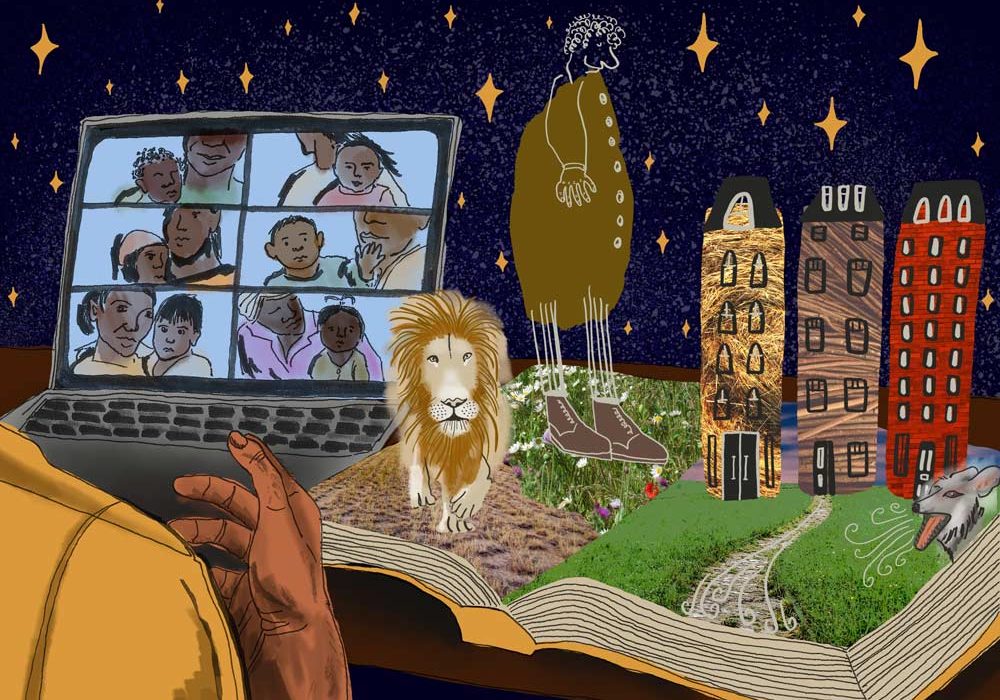
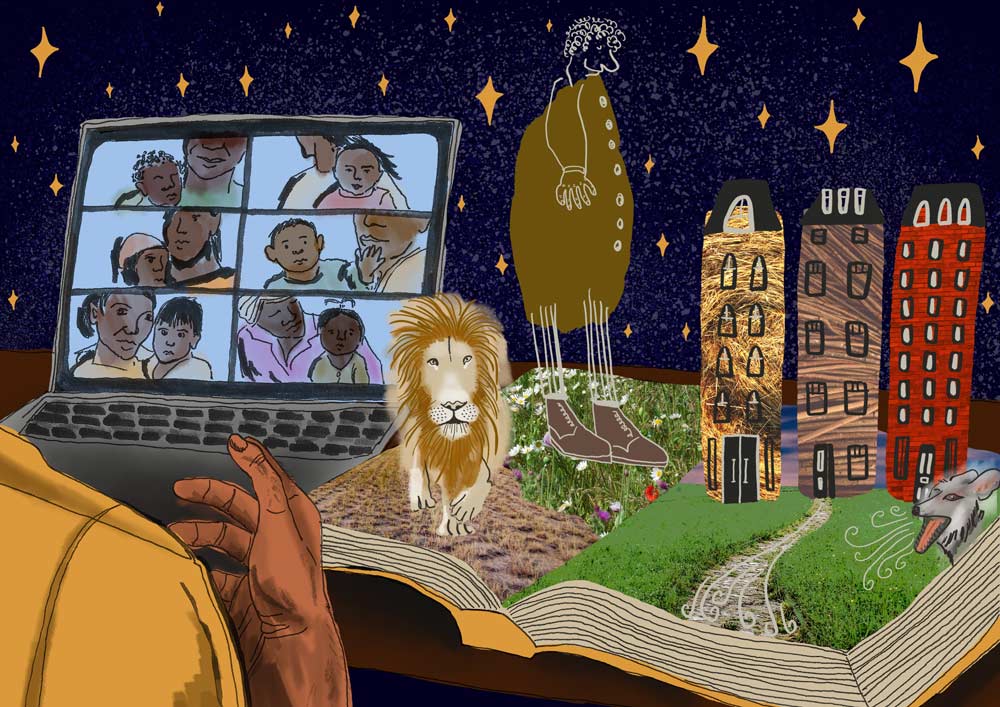
The illustration by Laurel Molly. Find her on Instagram @laurel_molly.
What stories to tell? When the Welcome Centre had to close down because of Coronavirus 19, Anna Burness, who runs the Early Years Project, suggested a weekly Zoom meeting with parents and children. This would include my telling a story. So, instead of being down on my hands and knees amongst the Lego at the creche, I now had the job of deciding which stories would work best for very young children.
At first I tried traditional tales with a feminist twist – so in my version Maid Marian rescued Robin Hood when he was captured by the Sheriff of Nottingham, and it was Guinevere who persuaded Arthur to pull the sword out of the stone. The other possibility was favourite stories from my own personal experience – diving into Bristol harbour when my wife fell in (a completely pointless rescue as she is a strong swimmer).
I got my five grandchildren to do the illustrations and Anna worked out a way of bringing up the images on the screen as I told the stories. The idea was that this might inspire the parents and children to do likewise – to tell their traditional or personal stories and then to have them illustrated by their own children.
But that was asking a lot, especially as most parents did not feel confident about their English. So we changed tack and I began to look again at the wonderful stories that I had once read to my children and was now reading to my grandchildren. Too many of them had white children as their central characters but some seemed to be possible candidates.
Oscar Wilde’s story The Selfish Giant especially so. I had been moved when reading it to my own children, especially the moment when the Giant, who had driven the children from his garden, changes his mind. He lifts the smallest child into the tree “and the tree broke into blossom and the birds came and sang on it.” Reading it to an audience of refugee children and their parents, it was impossible not to think of those who had been forced to leave their own homes and were unlikely ever to return to “the most beautiful garden they had ever seen.”
The edition of the story that I had found was sensitive to ethnicity and in the beautiful accompanying illustrations by Alexis Deacon, at least one of the children in the garden is wearing a hijab. I come from a filmmaking background so am very much aware of copyright issues but feel that no artist or writer would object to the non-commercial use that we are making of their words and pictures.
When I dug out a battered copy of Zookeeper Zoe (made by Boots Opticians to help identify colour blindness!), I was pleased to see that it is a brown girl who helps to solve a problem at the local zoo. And there are many stories where issues of ethnicity and gender are avoided by making everyone an animal. So Anna and I have used lots of those, traditional ones like the Three Little Pigs and more recent ones like The Lion Inside.
The central Bristol branches of both Foyles and Waterstones offer a huge choice of children’s books but a lot of these, while vividly illustrated, have worthy messages but no story line to engage the children’s attention. My name is not Refugee says all the right things – “You’ll be called Refugee but remember Refugee is not your name” – but seemed to me to stress the sad situation of all too many asylum seekers and to be totally unsuited to our storytelling sessions.
Julia Donaldson, the author of brilliant books like The Gruffalo, rightly objects to what she calls “books as medicine”, those with a heavy social message. She demonstrates that it is possible to get over a point with an engaging story – and to provide a few chuckles too. So too do Rachel Bright and Jim Field in their book The Lion Inside. Our viewers/listeners enjoyed joining in as the mouse learned how to ROAR and hopefully will remember
“that, no matter your size
We all have a mouse and a LION inside.”
Rhyme always helps and I must confess that another factor in my choice of a story is whether it gives me an opportunity to play roles – squeaky Little Billy Goat as well as the snarly (but not too alarmingly snarly) Troll. I seized the opportunity in that one, and in The Ugly Duckling, to sing too.
When I read stories to my grandchildren, I can watch out for audience reaction, see what stories go down well and which ones they are beginning to outgrow. Mighty yawns are a bit of a giveaway. It is more difficult to assess this on Zoom, but Anna is brilliant at keeping the children involved, remembering their names and getting them to suggest singalong songs.
Hopefully, we are getting something right – twenty-three children have taken part so far, and we will be keeping the weekly on-line sessions going until the coronavirus nightmare is over.
Colin Thomas
Please support the important work of this project.
Find out more about Early Years Project.

Until Coronavirus 19 struck, the Malcom X Centre was a place of welcome. Refugees and asylum seekers in Bristol could bring their children to the Early Years Project at Bristol Refugee Rights (BRR) to be looked after while they went to one of the classes available – for English, computer skills, or advice on coping with Britain’s fiendishly complicated asylum system.
The virus made that impossible so Anna Burness, who runs the Project, decided to maintain a virtual connection. Each week she makes contact with the children and their parents on-line, children’s songs are sung, and I, as a volunteer at BRR, read a different story each time. These stories have no direct connection to the experience of the children or their parents but sometimes they will have resonances for refugees – in The Selfish Giant the children are driven out of the garden in which they were playing happily, in The Ugly Duckling he is told to “quack, quack, get out of town” and in The Three Billy Goats the goats have to make a hazardous journey before they can reach the green green meadow on the other side of the rickety rackety bridge.
Every Christmas BRR, with the generous help of Parkway Church, has given presents to each of the children at the Early Years Project, carried into the Welcome Centre by Santa in his sack. This year a number of BRR volunteers, organised by Kathy Janes, took the presents to the younger children’s homes. I was one of them, dressed as Santa with a face mask underneath my cotton-wool beard.
It was a moving experience. The presents were going to find a home in some of Bristol’s most basic accommodation – a converted garage, the top flat of a high-rise block – but everywhere I was greeted with overwhelming delight by parents and children alike. Santa’s journey became a way of saying that at least some in Bristol want nothing to do with the ‘hostile environment’ policy. Few refugees in Bristol have yet found the green green grass but at least some have crossed the rickety rackety bridge.
Colin Thomas







